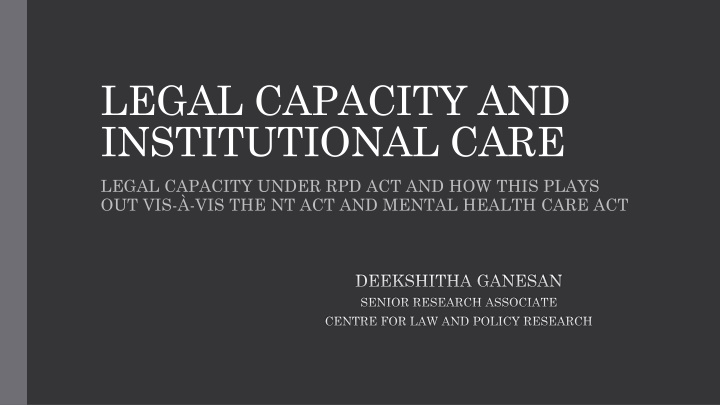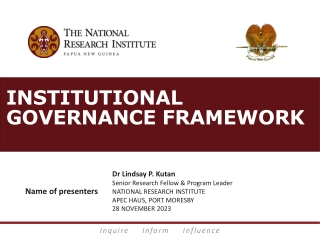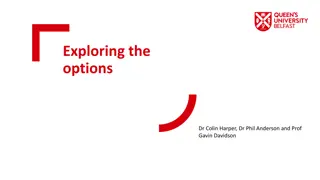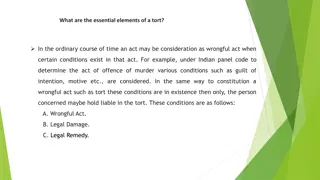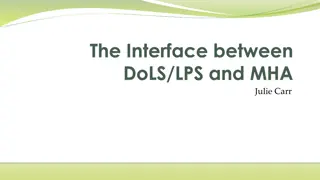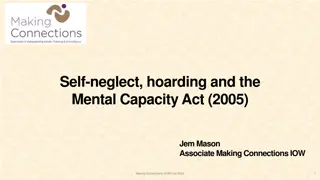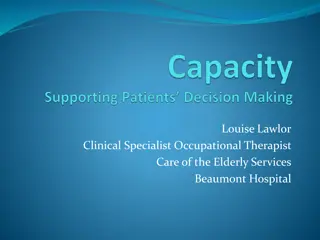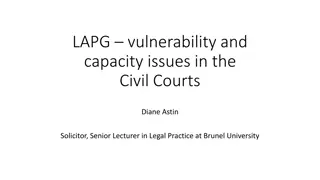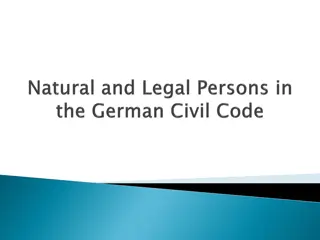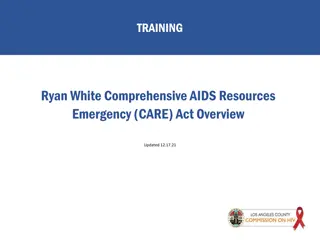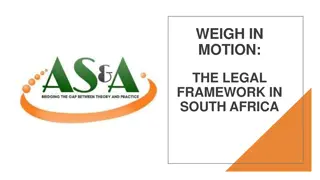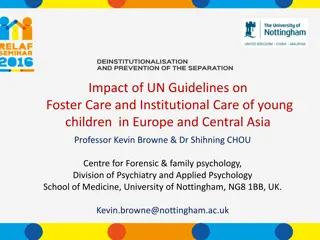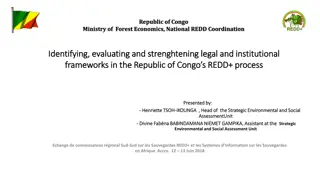Legal Capacity: RPD Act and Institutional Care
In the context of legal capacity under the RPD Act, this article explores the rights of individuals with disabilities to own property, control finances, seek support, and enter into legally binding arrangements. It also delves into the guardianship system and designation of authorities to support persons with disabilities in exercising legal capacity, particularly in institutional settings.
Download Presentation

Please find below an Image/Link to download the presentation.
The content on the website is provided AS IS for your information and personal use only. It may not be sold, licensed, or shared on other websites without obtaining consent from the author.If you encounter any issues during the download, it is possible that the publisher has removed the file from their server.
You are allowed to download the files provided on this website for personal or commercial use, subject to the condition that they are used lawfully. All files are the property of their respective owners.
The content on the website is provided AS IS for your information and personal use only. It may not be sold, licensed, or shared on other websites without obtaining consent from the author.
E N D
Presentation Transcript
LEGAL CAPACITY AND INSTITUTIONAL CARE LEGAL CAPACITY UNDER RPD ACT AND HOW THIS PLAYS OUT VIS- -VIS THE NT ACT AND MENTAL HEALTH CARE ACT DEEKSHITHA GANESAN SENIOR RESEARCH ASSOCIATE CENTRE FOR LAW AND POLICY RESEARCH
LEGAL CAPACITY UNDER RPD ACT Section 13 LEGAL CAPACITY Appropriate Government to ensure that persons with disabilities: Have the right to own or inherit movable and immovable property, control financial affairs and access loans, mortgages and other forms of financial credit Enjoy legal capacity on an equal basis with others and have right to equal recognition In case of conflict between person providing support and person with disability person providing support shall abstain from the transaction No presumption of conflict purely due to relationship by blood, affinity or adoption Person with disability may seek support and may alter, modify or dismantle any support arrangement and seek support of another but any such change will be prospective in nature will not nullify any third party transaction
Section 14 GUARDIANSHIP District court or designated authority as notified by the State Government may come to a finding that a person with disability requires additional support Persons with disability to be provided with additional support by a limited guardian to take legally binding decisions where such person is found to be unable to do so Decisions to be taken in consultation with the person with disability Limited guardianship system of joint decision making operating on mutual understanding and trust between the guardian and person with disability Section 15 Designation of Authorities to Support Mobilise community and generate awareness to support persons with disability in exercise of legal capacity Authorities to take measures to set up suitable support arrangements to exercise legal capacity for persons with disabilities living in institutions and with high support needs
OPERATIONALISING THE RPD ACT Persons with disabilities can themselves seek support for entering into legally binding arrangements or transactions No definition of support May include simple assistance with entering into legally binding transactions Person with disability can execute a Power of Attorney for instance to formalise the relationship between the person with disability and the person providing support Under Section 14, the court may decide whether a person with disability requires additional support No mention of the procedure for appointing an guardianship under Section 14 who should apply before the district court? Limited guardianship can be difficult to implement for persons with psycho- social disabilities especially in rural areas often entirely unable to take decisions
NATIONAL TRUST FOR WELFARE OF PERSONS WITH AUTISM, CEREBRAL PALSY, MENTAL RETARDATION AND MULTIPLE DISABILITIES ACT, 1999 The Act constitutes a Board with various powers and duties such as: Receiving one time contribution of 100 crores, the income from which is to be utilised in providing an adequate standard of living for persons with disability Receiving bequests of movable property for the benefit of persons with disability in general and to further objects of the trust in particular Receiving funds from the Central Government to carry out programmes such as counselling and training, establishing adult training units, foster family care and day care for persons with disability
Section 14 Appointment for guardianship Parent / relative / registered organisation may make application to the local committee for appointment of guardian for a person with disability Applications will not be accepted without the consent of the guardian of the person with disability Committee to consider if: Person with disability needs a guardian Purpose for which guardianship is required Committee should provide the obligations to be fulfilled by the guardians while approving an application Rule 16 Application for guardianship to be made to local committee in Form A by parent, relative or registered organisation Section 15 Duties of guardian Guardian shall have (a) care of person with disability and his property or (b) be responsible for the maintenance of the person with disability
The Board of Trust Regulations, 2001 applies to decisions taken under the National Trusts Act, 1999 Regulation 11 Who may apply for guardianship (in order of priority) Both parents may jointly apply In the absence of one due to death, divorce, legal separation, desertion, conviction one may singly apply for guardianship of ward beyond age of 18 years In the case of death, desertion, conviction of both parents, siblings (including half and step siblings) may apply Relative Registered organisation
MENTAL HEALTH CARE ACT, 2017 Mental illness substantial disorder of thinking, mood, perception, orientation or memory that impairs judgment, behaviour, capacity to recognise reality or ability to meet the ordinary demands of life but does not include mental retardation which is a condition of arrested or incomplete development of mind Section 5 Advance Directive Every person, not a minor, can make an advance directive specifying the individual(s) to be appointed as nominated representative It shall be invoked only when a person ceases to have capacity to make mental healthcare of treatment decisions and shall cease to be effective when the person regains capacity Section 14 Nominated Representative Every person, not a minor, has the right to appoint a nominated representative Where no nominated representative is chosen: the individual chosen under the advance directive or relative or care-giver or other suitable person may be appointed (in this order of priority)
Section 15 Nominated representative of minor Legal guardian will be the nominated representative Where legal guardian is unsuitable: Not acting in best interests of the minor Not fit to act in the capacity as nominated representative The Board may appoint a suitable individual who is willing to act as the nominated representative Section 16 Revocation/alteration of nominated representative Application made by person with mental illness, relative or psychiatrist responsible for their care Section 12 Permits review of advance directives by the Board which will provide recommendations
Section 17 Duties of nominated representative Consider the current and past wishes, life history, cultural background and best interests of the person with mental illness Priority to views of persons with mental illness to the extent that they understand nature of decisions Provide support in making treatment decisions under Section 89, 90 Seek information on diagnosis and treatment to provide support to person with mental illness Have access to family or home based rehabilitation services Involve in discharge planning under Section 98 Apply to mental health establishment for admission under Section 87, 89, 90 Apply to Board with respect to violation of rights in a mental health establishment
Section 2(i) Informed consent Consent given for a specific intervention, without force, undue influence, fraud, threat, mistake or misrepresentation, and obtained after disclosing to a person adequate information including risks, benefits and alternatives to the specific intervention Section 87 Admission of minor Nominated representative of minor must apply to the medical officer for admission Treatment only with the informed consent of the nominated representative Section 89, 90 Admission and treatment of persons with mental illness, high support needs, in mental health establishment (for 30 days and beyond) Treatment to be provided under these sections only after taking into account any advance directive or informed consent of the nominated representative Where the person with mental illness requires nearly 100% support from the nominated representative in making a treatment decision, the representative may provide temporary consent to the treatment plan
Section 94 Emergency treatment Registered medical practitioner may provide treatment for mental illness with informed consent of nominated representative to avoid death, irreversible harm, prevent causing serious damage to property etc Section 96 Restriction on psycho surgery Cannot be performed without the informed consent of the person on whom surgery is to be performed Section 99 Research Free and informed consent of persons with mental illness who are participating in the research is required Research may be allowed based on informed consent of nominated representative
COMPARISON - LEGAL CAPACITY RPD Act RPD Act applies to all persons with disabilities as covered under the Act RPD Act recognises the legal capacity of persons with disabilities first and then provides for limited guardianship where required Limited guardianship is clearly defined and is restricted to a specific period and for a specific decision / purpose All guardians appointed until the commencement of the RPD Act are limited guardians National Trusts Act Applies only to persons with autism, cerebral palsy, mental retardation and persons with multiple disabilities and severe multiple disability (80% or more multiple disabilities) It provides for guardianship for two purposes only but no limitation of time prescribed What is the status of guardians appointed under this Act after April 2017? Mental Health Care Act Applies only to persons with mental illness as defined in Section 2(s) Provisions primarily deal with consent for medical treatment and procedures and applies only for the period when the person ceases to have capacity to make mental health care decisions Introduction of principle of informed consent
